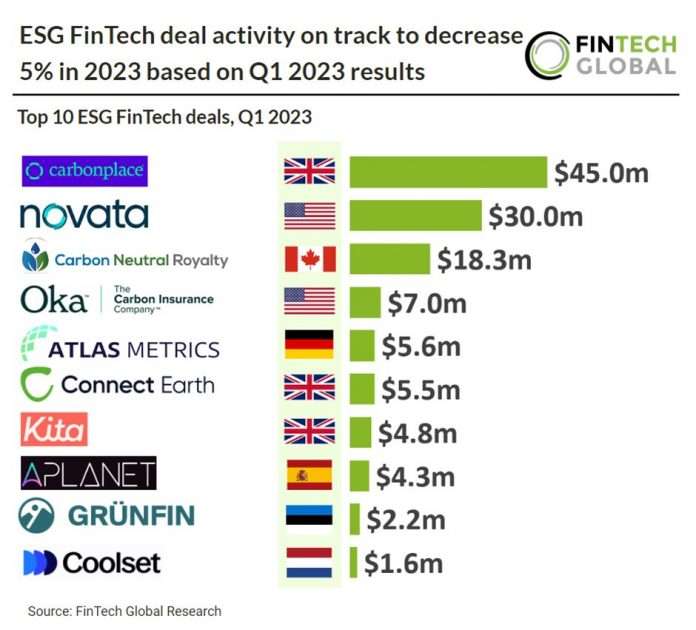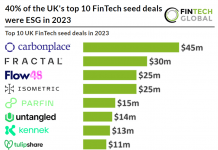Key ESG FinTech investment stats in Q1 2023:
• ESG FinTech companies raised 27 deals in Q1 2023, a 5.5% drop from Q1 2022
• The USA was the most active ESG FinTech country with six deals recorded in the country during the opening quarter of 2022
• Capital raised by ESG FinTech companies reached $130m in Q1 2023
ESG FinTech remains an active sector in Q1 2023 reaching 27 deals, a slight 5.5% drop from 2022 levels. This activity in Q1 predicts that ESG FinTech will drop by 5% in 2023. Investment raised by ESG FinTech companies reached $130m. Total investment raised by ESG FinTech companies in 2022 was $878m which indicates that 2023 investment is on track for another consecutive decline from 2021’s peak of $1.17bn.
Carbonplace, a global carbon credit transaction network, was the largest ESG FinTech deal in Q1 2023, raising $45m from nine investors in their seed funding round. The company plans to utilize the funds to increase the size of its platform and team, broaden its range of services to reach a more extensive customer base of financial institutions, and hasten collaborations with more carbon market participants across the globe, such as registries and marketplaces. Carbonplace aims to facilitate the trade of certified carbon credits by connecting buyers and sellers through their banks. The platform, which is set to be launched later this year, will enable immediate transfer of ownership upon payment, ensuring secure and traceable reporting throughout the carbon credit transfer process. This system will be available to financial institution clients who wish to provide their customers with a secure and transparent way to access carbon markets.
The USA was the most active ESG FinTech country in Q1 2023 with six deals announced, a 22% share of transactions globally. The UK was the second most active ESG FinTech country with four deals, a 15% share. Canada, Germany, The Netherlands and India were the joint fourth most active with two deals each.
Despite the strong deal making record, ESG is a divisive topic in United States. So far 18 states are proposing or have adopted anti-ESG legislation whilst 10 states have done the opposite and proposing or adopted pro-ESG as of December 2022. Anti-ESG states are generally Republican, although two are Democratic, Arizona and Minnesota. There are generally two types of anti ESG regulation. The first type of regulation, known as “No-ESG-investment regulations,” prohibits states from investing in strategies that consider ESG factors for any purpose other than maximizing investment returns. The second type, “Boycott regulations,” targets financial institutions that boycott or discriminate against companies in certain industries and prohibits the state from doing business with them or investing through them. These regulations affect financial institutions with investment policies that exclude or reduce exposure to certain industries that are economically important to the state, such as fossil-fuel-producing energy companies, mining, timber production, or firearms manufacturing.
The data for this research was taken from the FinTech Global database. More in-depth data and analytics on investments and companies across all FinTech sectors and regions around the world are available to subscribers of FinTech Global. ©2023 FinTech Global











